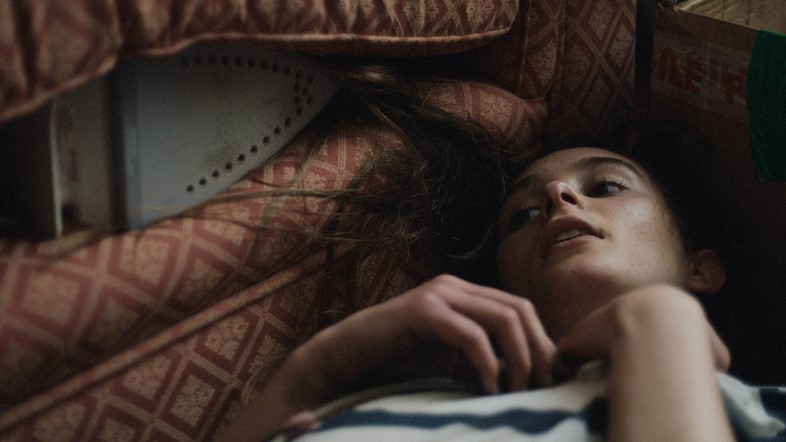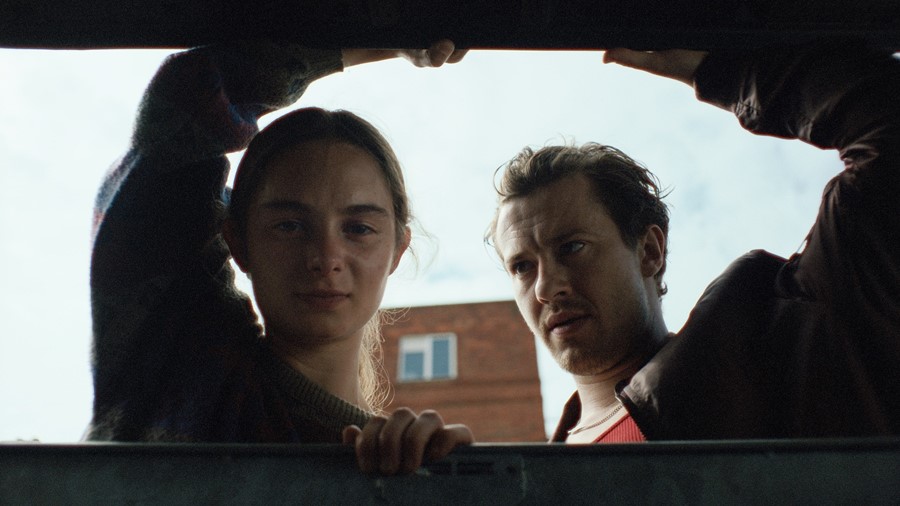As her film debuts at Venice Film Festival, Luna Carmoon talks about the inspiration behind her south London tale of compulsive hoarding
There was an odd stink on the set of Hoard, Luna Carmoon’s hypnotically strange first feature, which no one could seem to account for. “I don’t think people deserve to know everything!” says the Lewisham-born director, who secretly doused the interiors with a perfume smelling of sperm, milk, sweat and blood during the first part of the shoot. Then, for a while, she stopped. But when her protagonist’s world is upended later in the film and madness seeps into the picture, she began spraying the set again in incremental doses, triggering members of the cast who had no idea what she was up to.
Carmoon looks tickled as she shares this anecdote on a sunny day in Venice, where the film had its world premiere last night: chalk it up to the fact she’s only just regaining her own sense of smell after a bout of Covid, perhaps. Then again, Hoard is a film spilling with secrets. It’s a work of prepossessing strangeness, full of an autodidact’s feeling for film as a language beyond words, that puts Carmoon in a tradition of cinematic eccentrics like Nicolas Roeg and Ken Russell. (The director says she had a dream about Russell – “Daddy Ken”, as she calls him – the day she got the call to say her film had been selected for Venice.)
The plot concerns an otherworldly young girl called Maria (newcomers Lily-Beau Leach and Saura Lightfoot Leon, as younger and older versions of the character), who enjoys a close relationship with her mum (Hayley Squires), a compulsive hoarder who takes her out trawling through skips with a shopping trolley after dark. When the pair are separated following an incident at home, the film’s action pitches forward ten years to the mid-90s, Maria now happily rehomed with a foster mum and about to get her A-level results. But when Michael (Stranger Things' Joseph Quinn), another foster kid ten years her senior, moves back into the house, a bond based on shared trauma is established that will lead her to the brink of madness. “It’s like a Gemini thing of just knowing,” says Carmoon of their relationship, “a silent knowing that something in the animal is wounded and you can see it in each other.”

Maria’s confusion is brought vividly to life by first-time actor Saura Lightfoot Leon, who brings an irreverent spark and unruly physicality to the role. “She just has this rhythm, this essence,” says Carmoon of her star, commending her ability to roll with the film’s weird, sing-song ear for south London vernacular. “Someone almost had to be a dancer to get the sort of syntax of the dialogue and the behaviour.” Quinn, who was cast as Michael before his scene-stealing turn as Eddie Munson in Stranger Things had aired, bulked up for the part because Carmoon had envisaged an Oliver Reed-type figure in the role (“You don’t see bodies like that on-screen any more”). In the film’s most indelible scene, Quinn plays matador to Maria’s raging bull, the pair’s dangerous attraction coming to a literal climax in front of the telly.
Trauma isn’t just the central theme of Hoard, it’s the animating impulse behind its writing. Carmoon says the idea came to her in lockdown, when she found a trove of optical illusions her late nan had kept buried in a drawer while clearing through her things. “Spiralling” from the isolation of the period, she began writing the story as an extended suicide note. “I was gonna leave it at the end of the bed wrapped in a ribbon,” says Carmoon, who thinks the process of writing it may have ended up saving her. “I went from venom and grief and sadness to another kind of sadness, it was like the stages of grief, and then when I’d [finished] the script it was just love, it healed me.”
Part of the ‘venom’ Carmoon felt during Hoard’s writing stemmed from the knowledge that opportunities like this don’t come often for people from backgrounds like her own. Born and bred in Downham, Lewisham (“the bit that hasn’t been gentrified yet”), the director shared a room with her mum between the ages of ten and 22 and got her break in the industry through a grant aimed at supporting underrepresented artists in the UK. She was bullied, like Maria, in school and sought refuge in film, skipping classes to subsist on a diet of three films a day. She credits her mum with trusting that “I had my own compass”, and her sister with instilling a sense of conviction in her own voice: “I never diluted myself, it doesn’t matter if I got beat or spat it. That’s all you have at the end of the day: you and your identity.”
Certainly, there’s no mistaking Hoard as the work of another artist – not something you can say about every director making their debut. Like the rubbish that’s amassed in Maria’s childhood home – or Carmoon with her stash of rank-smelling perfume – it’s a film full of secrets, each to be treasured.
